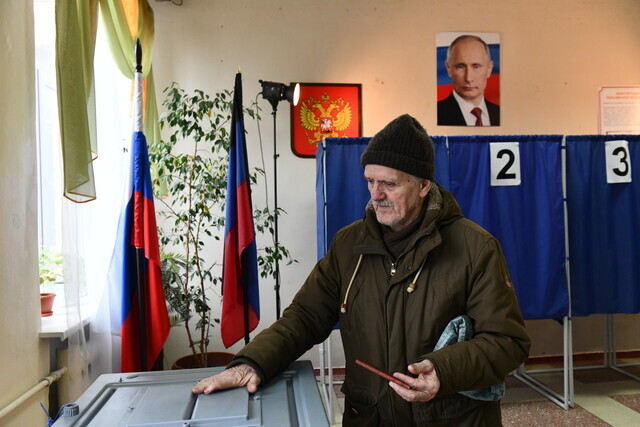hankyoreh
Links to other country sites 다른 나라 사이트 링크
As West condemns Russian election, Seoul opts to forgo comment

The South Korean government avoided direct comment in its response to the recent Russian presidential election, which ended in a landslide victory for incumbent Vladimir Putin.
Instead, it stressed that the two sides “have a shared commitment to managing our mutual relationship.” Its position showed subtle differences from the response by the US, the European Union, and other countries in the West that strongly condemned the election as “undemocratic.”
When asked by a reporter Tuesday for Seoul’s position on the Russian presidential election, a Ministry of Foreign Affairs official said, “Our basic position is that we are refraining from comment on the recent election in Russia.”
When asked if the administration planned to send a congratulatory cable in response to Putin’s reelection, the official said only that there would be “considerations of the appropriateness and so forth.”
At the same time, Seoul did criticize the collection of votes from regions of Ukraine that were occupied by Russia following its invasion — including Donetsk, Luhansk, Zaporizhzhia and Kherson — calling this a “violation of international law.”
The diplomatic official said, “Russia’s invasion of Ukraine was a violation of the UN Charter and international law, and the administration’s basic position is that Ukraine’s sovereignty and the preservation and independence of its territory must be respected.”
The US and the countries of Europe have been outspoken already in condemning the Russian presidential election as “unfair.”
White House National Security Council spokesperson Adrienne Watson said on Saturday that Putin’s election win was “unsurprising” and that the process itself was “obviously neither free nor fair.”
In a message posted on the social media site X (formerly known as Twitter), the German Federal Foreign Office wrote, “The pseudo-election in #Russia is neither free nor fair, [and] the result will surprise nobody.”
“Putin's rule is authoritarian, [and] he relies on censorship, repression & violence,” it continued.
Also on X, UK Foreign Secretary David Cameron wrote, “The polls have closed in Russia, following the illegal holding of elections on [occupied] Ukrainian territory, a lack of choice for voters and no independent OSCE monitoring,” referring to the Organization for Security and Co-operation in Europe.
“This is not what free and fair elections look like,” he said.
The South Korean government’s avoidance of open criticism of Russia’s presidential election, in contrast with the countries of the West, showed a different look from President Yoon Suk-yeol’s past emphasis on “freedom” and remarks about battling “communist totalitarian dictatorship.”
Its response appeared to reflect consideration of security concerns amid the recent rapid bolstering of closeness and military cooperation between Russia and North Korea, along with the practical pressures that Russia has been ratcheting up with measures such as Russian intelligence authorities’ detention of a South Korean missionary on espionage charges.
By Park Min-hee, senior staff writer
Please direct questions or comments to [english@hani.co.kr]

Editorial・opinion
![[Column] Season 2 of special prosecutor probe may be coming to Korea soon [Column] Season 2 of special prosecutor probe may be coming to Korea soon](https://flexible.img.hani.co.kr/flexible/normal/500/300/imgdb/original/2024/0426/3317141030699447.jpg) [Column] Season 2 of special prosecutor probe may be coming to Korea soon
[Column] Season 2 of special prosecutor probe may be coming to Korea soon![[Column] Park Geun-hye déjà vu in Yoon Suk-yeol [Column] Park Geun-hye déjà vu in Yoon Suk-yeol](https://flexible.img.hani.co.kr/flexible/normal/500/300/imgdb/original/2024/0424/651713945113788.jpg) [Column] Park Geun-hye déjà vu in Yoon Suk-yeol
[Column] Park Geun-hye déjà vu in Yoon Suk-yeol- [Editorial] New weight of N. Korea’s nuclear threats makes dialogue all the more urgent
- [Guest essay] The real reason Korea’s new right wants to dub Rhee a founding father
- [Column] ‘Choson’: Is it time we start referring to N. Korea in its own terms?
- [Editorial] Japan’s rewriting of history with Korea has gone too far
- [Column] The president’s questionable capacity for dialogue
- [Column] Are chaebol firms just pizza pies for families to divvy up as they please?
- [Column] Has Korea, too, crossed the Rubicon on China?
- [Correspondent’s column] In Japan’s alliance with US, echoes of its past alliances with UK
Most viewed articles
- 1‘We must say no’: Seoul defense chief on Korean, USFK involvement in hypothetical Taiwan crisis
- 2Is Japan about to snatch control of Line messenger from Korea’s Naver?
- 3Division commander ordered troops to enter raging flood waters before Marine died, survivor says
- 4S. Korea “monitoring developments” after report of secret Chinese police station in Seoul
- 5The dream K-drama boyfriend stealing hearts and screens in Japan
- 6[Column] Season 2 of special prosecutor probe may be coming to Korea soon
- 7[Editorial] Korea’s surprise Q1 growth requires objective assessment, not blind fanfare
- 8No good, very bad game for Korea puts it out of Olympics for first time since 1988
- 9[Column] ‘Choson’: Is it time we start referring to N. Korea in its own terms?
- 10Is N. Korea threatening to test nukes in response to possible new US-led sanctions body?